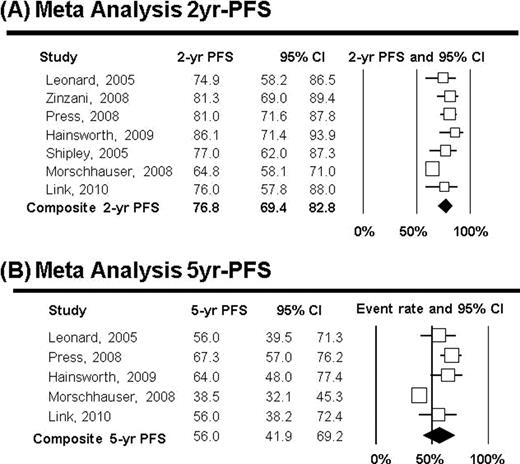Abstract
Abstract 101
The disease course of FL is characterized by multiple relapses and progressively shorter response durations with subsequent therapies. As a result, numerous treatment strategies have been developed to reduce the risk of progression including consolidation with transplantation, radio-immunotherapy (RIT), or maintenance therapy with rituximab (R). At present, the optimal therapeutic strategy for FL patients (pts) remains undefined. R maintenance and RIT with an anti-CD20 antibody linked to iodine-131 (I131 Tositumomab) or to yttrium-90 (Y90-ibritumomab tiuxetan) have emerged as well tolerated treatments following induction. To quantify the benefits of consolidative RIT, we conducted a systematic review of the literature and a meta-analysis of selected studies. Methods: As part of a broader review, we searched the Cochrane Central Register of Controlled Trials (Cochrane Library Issue, 2011), MEDLINE (1/1966-6/2011), American Society of Hematology Annual Meeting abstracts (2004–2010), and American Society of Clinical Oncology Annual Meeting abstracts (2007–2010). Each database was searched using combinations of the term ‘follicular lymphoma' and the terms for treatment regimens. Inclusion criteria for studies were as follows: 1) reports on phase 2/3 studies; 2) n≥30; 3) previously untreated patients 4) treatment with RIT targeted at the CD20 antigen following an induction regimen; 5) original reporting in English of the following treatment outcome measures for pts with FL: CR/CR-unconfirmed, OR, and at least one form of survival data. Extracted data included pre-treatment disease status, pt characteristics, treatment regimen, progression free survival (PFS), overall survival (OS), complete response (CR) and overall response (OR). Pooled estimates of the CR rate, OR rate, 2-year PFS and 5-year PFS for pts treated with consolidative RIT were computed using DerSimonian and Laird random effects models. Results: Over 1136 records were reviewed with 8 studies meeting inclusion criteria with 556 patients. Between 1998 and 2007, pts were accrued at multiple sites in all but one study. Median ages ranged from 49–57 years with 41–61% male subjects, among the studies reporting gender. A weighted average of 97.2% of patients had stage III/IV disease with 73–98% pts having grade 1/2 disease, among those studies reporting histology. Among studies reporting this information, 19–44% of patients had abnormal LDH values, and 25–100% had bulky lymph nodes. CR rates ranged from 51% to 97%, 2-year PFS ranged from 65% to 86%, and 5-year PFS ranged from 38% to 67%. The pooled estimates of the CR rate and OR rate following consolidative RIT were 78% (95% CI 66%–87%) and 98% (95% CI 92.9%–99.5%), respectively (Figure A). The pooled estimates for the 2-year and 5-year PFS were 77.0% (95% CI 70.5–82.4%) and 56.0% (95% CI 41.9–69.2%), respectively (Figure B). Conclusions: This analysis suggests that consolidative RIT is beneficial to patients with previously untreated FL with meaningful CR rates and 5-year PFS. In addition, consolidative RIT compares favorably to maintenance therapy with R given after chemotherapy (ECOG 1496) in both 2-year PFS (77.0% vs. 73.5%) and 5-year PFS (56.0% vs. 46.4%), and needs to be compared to maintenance R following R-chemotherapy induction.
Flowers:Genentech/Roche (unpaid): Consultancy; Celgene: Consultancy, Research Funding; Millennium/Takeda: Consultancy, Research Funding; Seattle Genetics: Consultancy; Novartis: Research Funding; Spectrum: Consultancy, Research Funding.
Author notes
Asterisk with author names denotes non-ASH members.


This feature is available to Subscribers Only
Sign In or Create an Account Close Modal